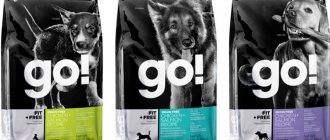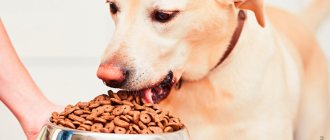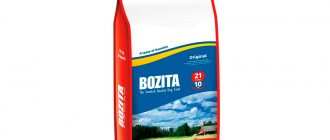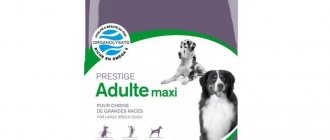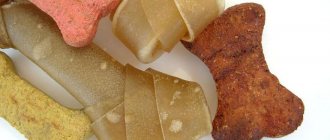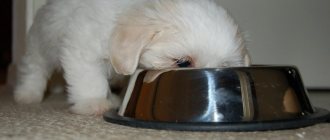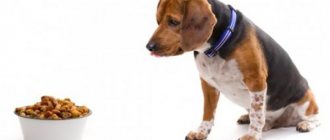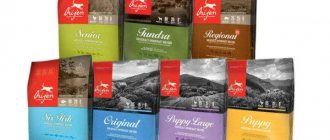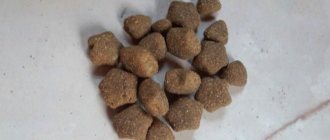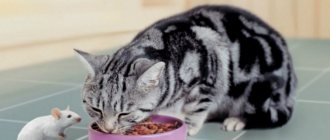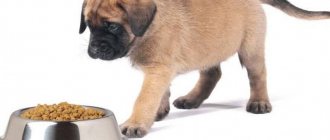Despite the fact that over hundreds of years dogs have turned from wild animals into domestic pets, their digestive system has not changed - they still remain predators. Therefore, the most typical food for them is meat, and preferably without impurities. But, in the modern world, not all owners can afford to buy meat every day, and here factory-made dry food comes to the rescue.
They are cheaper than meat, have a good composition, and already contain all the necessary vitamins and minerals. But the bulk of feed contains one ingredient that negates all the benefits - grain and its derivatives. Dogs practically do not digest grains, and therefore grains cannot be called complete substitutes for meat components. This additive is intended only to reduce the price of the finished product, as it is a cheap source of calories.
An alternative could be grain-free dog food - a diet consisting of 50-80% meat and meat components and completely free of grains. It is precisely these foods that we will talk about today.
What is grain-free food?
As the name implies, this diet does not contain grain crops, and it is not only wheat that spoils the picture - rice, corn, barley and other grains that humans eat are not much healthier for dogs.
The market offers holistic-class dry food in which wheat or barley has been replaced with poultry, fish, meat and offal. These foods also contain vegetables designed to enrich your pet’s diet with fiber. Holistic formulas contain herbs, roots and fruits so that your dog can get vitamins from the food in the most natural way.
But their main trump card is meat and meat components. But there is a nuance here - food at this level includes exclusively healthy by-products (liver, lungs, stomach), and connective tissue (cartilage and protein components of the blood).
In addition to holistic products, there is also a super-premium grain-free dog food. In such menus, grain is replaced with healthier vegetables - potatoes, sweet potatoes, pumpkin, etc. This, of course, is better than cereal fillers, but is inferior to meat components in terms of nutritional value and digestibility. Most often, this grain-free food is purchased for dogs with food allergies or gluten intolerance.
Peculiarities
The formulas are developed primarily for animals prone to allergies. Everyone knows that cereals contain gluten, to which an allergic reaction occurs. In addition, pets do not particularly need grains and this was one of the reasons for the creation of grain-free food. After all, dogs are carnivores by nature and their main source of nutrition should be meat. The amount of meat in dry grain-free food can be up to 80%. High-quality feed has a balanced ratio of Omega-3 and Omega-6 fatty acids, so the increased protein and fat content does not pose a risk to the health of the animal. Otherwise, the high protein and fat content puts a strain on the liver and kidneys.
Cereals are a source of carbohydrates, but special feeds contain vegetables as carbohydrates, usually potatoes, sweet potatoes, and peas. Moreover, there are much more carbohydrates in some vegetables, for example potatoes, than in cereals. You also need to pay attention to the percentage of carbohydrates, because if the percentage is high, then with constant consumption of such food and a sedentary lifestyle, the pet risks gaining excess weight.
Certain foods do not contain many meat ingredients; instead of vegetables and grains, they add cake or other cheap ingredients of plant origin. So manufacturers are trying to reduce the cost of food, while presenting it as high-quality and hypoallergenic. In fact, animals can also be allergic to protein, such as beef.
When choosing grain-free food, you should carefully study the information on the packaging, taking into account the age, size, activity level, physiological state, and nutritional needs of the animal.
Acana, Orijen, Wysong, and Taste of the Wild are recognized as the best grain-free foods.
Why do you need grain-free dog food?
Eliminating grain from a dog's diet is overcoming one of the barriers to improving the nutritional properties of food and ensuring health, longevity, and excellent physical fitness. The main advantage of a grain-free diet is its low glycemic index, which reduces the risk of one of the most common diseases - obesity. In addition, the grain-free (gluten-free) formula eliminates digestive disorders and food allergies in dogs.
In addition to the obvious benefits, this type of feed is necessary for active animals that expend enormous amounts of energy. These are service dogs, animals that live outside in winter (watchdogs and guard dogs), and simply pets that have long walks with high physical activity. Wheat is not able to provide replenishment of such an amount of energy, and therefore grain-free feeds are used, which are significantly higher in calories.
Grain-free feed: facts and speculation
Many pet owners believe that grain-free diets are better for their pets because they are more natural, carbohydrate-free, and less likely to lead to health problems such as allergies, which is not the case.
Better for pets?
There is no conclusive evidence demonstrating that grain-free diets are better for pets. Therefore, veterinarians should educate pet owners about the nutritional value of food and the difference between nutrients and ingredients.
- Nutritional value is the property of food to satisfy the needs of animals for energy and nutrients.
- Pets need nutrients to stay healthy.
- Ingredients are vehicles for nutrients.
- Proper nutrient intake is essential for normal development of pets, general animal health, and disease management.
- Nutrients have numerous metabolic roles required for normal physiological processes that can be disrupted by insufficient or irregular intake.
Distorted ideas
Pet owners often encounter misinformation about grain-based foods. Here are some of the most common misconceptions:
- Grains are fillers in pet foods
Filling is an ingredient that has little or no nutritional value, but grains contain important nutrients such as vitamins, minerals and essential fatty acids. Various grain products also contain protein, which may be easier for pets to digest than some meat proteins. Most dogs and cats (>90%) can use and absorb nutrients from grains in food.
- Grain-free foods do not contain carbohydrates
Grain-free foods usually contain carbohydrates from other sources, such as sweet potatoes, which contain even more carbohydrates than corn. In addition, carbohydrates are an important source of energy, and one of the 6 essential nutrients (water, proteins, fats, carbohydrates, vitamins, minerals).
It is important to remember that the variety of grain-free diets on the market means a variety of nutritional profiles that affect not only carbohydrate content, but also protein, fat and other nutrients. The low carbohydrate content of grain-free foods may indicate higher amounts of fat and calories. Some grain-free diets simply replace grains with highly refined starches (eg, potatoes, cassava), which contain fewer nutrients and less fiber than grains. Other grain-free foods replace grains with beans, peas or lentils, which are also sources of carbohydrates but are not necessarily better for animals than grains and can sometimes lead to digestive upset.
- Cereals cause food allergic reactions
Food allergies and hypersensitivities are abnormal reactions to a normal food or ingredient. Food allergies are rare in pets (<1% of skin diseases, <10% of all allergies) and allergic reactions to grains are even rarer. The most common likely allergen in animals diagnosed with food allergies is animal protein (eg, beef, chicken, dairy), which is found in both types of pet foods.
- Cereals cause gluten intolerance
Celiac disease is an inherited autoimmune disease that occurs in humans and is associated with hypersensitivity to the gluten protein found in certain grains such as wheat, rye, and barley. Gluten intolerance is extremely rare in dogs and absent in cats. Only one line of Irish Setters has been found to show signs of digestive problems when eating gluten-containing foods.
conclusions
The growing grain-free pet food industry reinforces the misconception that grains are bad for animals. In addition, pet owners are increasingly considering their pet's diet to be as important as their own. Therefore, some trends in human nutrition have found their response in the animal feed market, especially those focusing on health. Remember that grain-free diets do not provide any greater health benefits than grain-containing diets, and each diet should be considered based on its overall nutrient profile, not just individual ingredients.
Source: Grain-Free Pet Foods: Fact vs Fiction
See also:
- New data on merle genotypes and phenotypes in dogs
- Is your dog kind?
- Is this dog really happy?
- To cut or not to cut: what do we know about the properties of fur and thermoregulation in dogs
- Can dogs make and use tools?
- Dogs see the world differently than people
- Quality of life for dogs
- The sad truth about dogs and depression
- Old dogs and new research
- How does your dog's nose know so much?
- 3
Shared - 1
- 1
- 1
Best lines
There are many diets on the market that are full of “grain-free” inscriptions, but only some of them can be guaranteed to be classified as grain-free foods. Their distinctive feature is always the price - a product, even half consisting of natural meat, cannot be cheap - the cost of the diet will be high in comparison with conventional feed, which contains two or more types of cereals. But there are brands that have been producing top grain-free food for many years:
- Orijen is a product of Champion Petfoods, a Canadian company committed to producing Biologically Appropriate Pet Food. This means that all the ingredients used to create the diet are typical for feeding dogs in the wild, so to speak, in nature. Plus, the highest quality ingredients only made in Canada make this dog food an excellent option for everyday feeding.
- Acana is a product of the same concern. According to the manufacturer, any grain-free dog food for Akana dogs is made only from fresh products suitable for human consumption. This means that canning of raw materials, freezing, or other processes designed to prevent the product from deteriorating are excluded. The emphasis is also on free range - all animals whose meat is used in the feed are raised using green farming methods and are not kept in pens or stalls.
- Pronature is the brainchild of PLB International, a Canadian family-owned company that has been producing animal feed for many years. Credo. The trick of this food is the use of one source of meat - this allows you to avoid allergies and choose nutrition for individual food intolerances.
- Go! Natural is a grain-free dog food from Canada, created by Petcurean specialists. For almost 20 years, this plant has been developing and producing high-quality holistic dog food. The raw materials used undergo quality control and are also checked for freshness and chemical purity - pesticides in vegetables or antibiotics in meat are not acceptable. Thanks to high production standards, diets of this brand have become popular all over the world.
- Grandorf is the result of collaboration between Italian and Belgian pet food professionals. Grain-free food of this brand is produced in Italy by Monge & C SpA, as well as in Belgium by United Petfood Producers NV. High-quality meat and additional ingredients make this food a welcome addition to any dog’s bowl – he’s guaranteed to love it!
- Farmina - the N&D GrainFree series of this manufacturer has already become firmly established in the everyday life of many dog lovers who care about the health of their pet. Factories in Brazil, Italy and Serbia produce food from the best meat, vegetables, fruits and herbs to ensure that the dog eating their product is healthy and full of strength throughout its life. Farmina grain-free dog food is the key to your pet’s excellent health and appearance!
- Arden Grange is a product of the British company of the same name, located in the town of Elburn. The founders of the factory started by breeding shepherd dogs, but later became so interested in food recipes for their dogs that they decided to produce high-quality food for sale. This is how dry food Arden Grange appeared - high-protein holistic diets designed to provide the dog’s body with everything it needs.
- Bozita Naturals is a Swedish grain-free food produced by a factory with more than a century of history. Thanks to the high standards of production, as well as the demanding laws of Sweden, this feed is exceptionally good - all products are carefully selected and suppliers are checked multiple times before delivering their raw materials to the production lines. Thanks to this approach and scrupulousness, the Bozita company is today known throughout the world.
- Wolfsblut – German quality for all dogs. The recipes for this food are developed by leading laboratories in Europe, and the production itself is located in Germany. Good composition and the absence of grains make this food an excellent alternative to cheaper and low-quality super-premium food.
- Brit Care is a Czech food produced by VAFO PRAHA. And although this is not a holistic food, but a strong super-premium class, we can talk about high quality and nutrition - any Care series diet is grain-free dog food containing sweet potatoes or potatoes as a source of carbohydrates.
In addition to this list, there are many more companies producing grain-free diets - we looked at only the most popular ones, which can be seen on the shelves of almost any pet store in the country.
You can now view the current price of food and buy it right here:
We hope our brief review will help you choose the right diet for your pet, and we just want to remind you once again that any grain-free food for dogs of the holistic class is almost ideal nutrition that does not require additional feeding with vitamins, minerals and other useful substances. Switch to holistic food as soon as possible, and your four-legged friend will be immensely grateful for good food!
